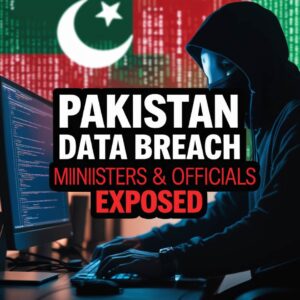Government Responds to Fresh Data Leak Reports
Islamabad — Pakistan’s Interior Minister Mohsin Naqvi has taken immediate notice of alarming reports that sensitive data of SIM card holders, including senior officials and ordinary citizens, is allegedly being sold online. In response, the Interior Ministry has announced the formation of a special investigation team tasked with completing its findings within 14 days.
According to the official press release, the National Cyber Crimes Investigation Agency (NCCIA) will lead the probe, aiming to identify those responsible for the breach and recommend legal action.
This development follows widespread media coverage highlighting the scale of the breach and its potential impact on Pakistan’s national security and citizens’ privacy.
What the Reports Claim
Media outlets have reported that the leaked data includes:
- SIM holders’ personal details (including the interior minister himself)
- Mobile phone locations, allegedly sold for around Rs500
- Call data records, allegedly available for Rs2,000
- International travel details, reportedly sold for Rs5,000
These allegations, if verified, point to one of the most serious personal data compromises in Pakistan’s history.
Cybersecurity Advisory and Past Warnings
This is not the first time Pakistan has faced such warnings. Only a few months ago, the Pakistan National Computer Emergency Response Team (PKCERT) issued a cybersecurity advisory alerting that login credentials of over 180 million Pakistani users were found in a global database of stolen information.
That breach reportedly exposed:
- Usernames and passwords
- Email addresses
- Associated URLs for services such as social media, government portals, financial institutions, and healthcare systems
PKCERT highlighted that this massive trove of information was compiled using infostealer malware, a type of malicious software designed to extract sensitive information from infected devices. Shockingly, the data was stored in plain text without encryption or password protection — making it easy for criminals to exploit.
Why This Breach Matters
Cyber experts warn that such leaks can be exploited in multiple ways:
- Identity theft using exposed CNIC or personal records
- Account takeovers through credential stuffing
- Targeted phishing attacks using stolen email addresses
- Unauthorized access to government and corporate portals
- Social engineering campaigns aimed at officials and citizens
The exposure of sensitive data linked to federal ministers, senior bureaucrats, and regulators significantly raises the stakes, as this is no longer just a matter of individual privacy but also of national security.
Historical Context: Not the First Breach
Pakistan has experienced several high-profile data security failures in recent years:
- In March 2024, a Joint Investigation Team (JIT) revealed that the credentials of 2.7 million citizens had been compromised in a leak from the National Database and Registration Authority (NADRA), spanning between 2019 and 2023.
- Earlier cases of SIM data leaks and banking data compromises have also been reported, though enforcement actions have remained limited.
These incidents point to a recurring pattern: warnings are issued, but systematic reforms in data protection often lag behind.
Official Silence and Public Concerns
Despite repeated advisories, government authorities such as the PTA and NCCIA have previously faced criticism for inadequate enforcement. Citizens have expressed frustration, arguing that cybercriminals appear to be operating with little fear of consequence.
The interior minister’s latest directive is seen as an attempt to change this perception. Analysts, however, caution that timely action and transparency will be key to restoring public confidence.
Global Comparison
Globally, countries are investing heavily in cyber defense infrastructure and passing strict data protection laws. For example:
- The EU’s GDPR imposes heavy fines for data mishandling.
- India has introduced the Digital Personal Data Protection Act 2023, focusing on stronger user rights.
- The US has multiple federal and state-level cybersecurity laws.
Pakistan, on the other hand, is still developing its Personal Data Protection Bill, which experts say needs to be fast-tracked to match international standards.
The Way Forward for Pakistan
Experts recommend several urgent measures:
- Strengthen legal frameworks — passing a comprehensive Data Protection Act.
- Upgrade technical capacity of agencies like PKCERT and NCCIA.
- Mandate encryption for all sensitive user databases.
- Raise public awareness about password hygiene and phishing.
- Hold entities accountable for negligence in protecting citizen data.
Cybersecurity analysts stress that unless Pakistan invests in robust systems and consistent enforcement, such breaches will continue to repeat.
Final Word
The formation of a special team under the interior minister is an important step, but the real challenge lies in implementation and accountability. With millions of citizens’ data at stake — including top government officials — the issue can no longer be ignored.
Pakistan’s digital future depends not only on connectivity but also on trust and security.




Leave a Reply